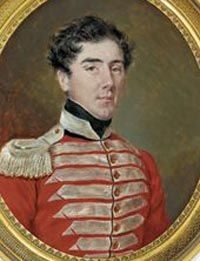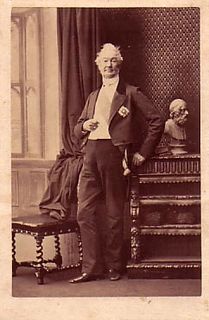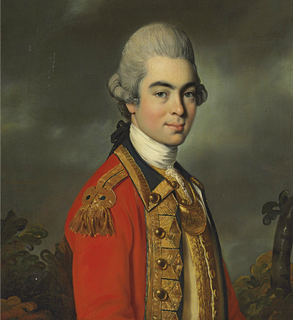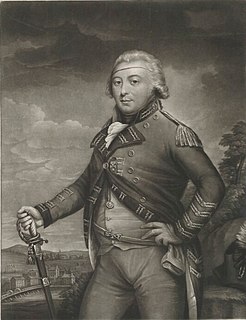
General Henry Dundas, 3rd Viscount Melville GCB was a senior British Army officer and peer.

Lieutenant-General Sir Henry William Stisted,, served as the first Lieutenant Governor of Ontario after Confederation, from 1867 to 1868.
Field Marshal Lord Frederick Cavendish was a British Army officer and Whig politician. After serving as an aide-de-camp to the Duke of Cumberland in Germany during the early stages of the Seven Years' War, he served under Charles Spencer, 3rd Duke of Marlborough during in the raid on St Malo and then took part in the raid on Cherbourg. Cavendish commanded the rear-guard during the re-embarkation following the disastrous battle of Saint Cast and was taken prisoner. After his release, Prince Ferdinand of Brunswick gave him command of a brigade of chasseurs which he led to victory at the Battle of Wilhelmsthal in June 1762.

Lieutenant-General Sir Colin Campbell was a British Army officer and colonial governor.

General John Hely-Hutchinson, 2nd Earl of Donoughmore, GCB was an Anglo-Irish politician, hereditary peer and soldier.
General Sir James Dawes Douglas was a British Army officer, who had a long and illustrious military career, which included commanding Portuguese troops in the Peninsular War.

General Ulysses de Burgh, 2nd Baron Downes, was an Irish soldier and Tory politician. A General in the British Army, he served as Surveyor-General of the Ordnance under Lord Liverpool between 1820 and 1827. After succeeding a cousin as second Baron Downes in 1826, he sat in the House of Lords as an Irish Representative Peer from 1833 until his death.
William Balfour (1785–1838), was a lieutenant-colonel in the British Army.

George Forbes, 6th Earl of Granard (1760–1837), was an Irish general.
Sir William Henry Elliott, (1792–1874), was a British Army general.
William Havelock, KH (1793–1848) was a cavalry officer in the British Army, rising to the rank of lieutenant-colonel.

General Sir James Duff (1752–1839) was a British army officer, who fought in the Napoleonic wars and Member of Parliament (1784–1789).

Major-General Sir Henry Johnson, 1st Baronet, was an Anglo-Irish general in the British Army.
Lieutenant-Colonel Henry Worsley CB was a British Army officer. He was the third son of James Worsley (1748−1798), rector of Gatcombe on the Isle of Wight, by his wife, Ann Hayles.
Major-General Sir Henry Worsley, (1768−1841) was a British Army officer who served for most of his career in India.
General Alexander Ross (1742–1827) was a British officer who served in the American War of Independence and in India, rising to the rank of general. He was a close friend of Charles Cornwallis, 1st Marquess Cornwallis.
General Sir Thomas Reed, was a British Army officer and the 20th General Officer Commanding, Ceylon.
Sir Henry Oakes (1756–1827), 2nd baronet was a lieutenant-general in the East India Company's service.
General George Whichcote was a senior officer in the British Army.
General Sir Abraham Josias Cloëté KCB (1794–1886) was a senior officer in the British Army.













